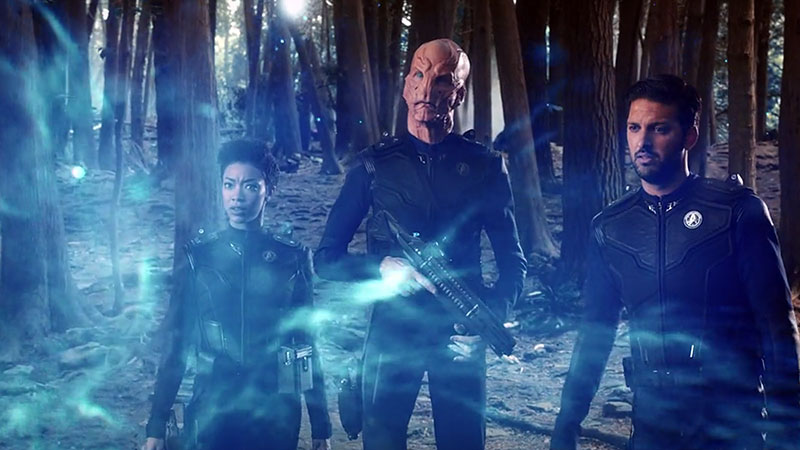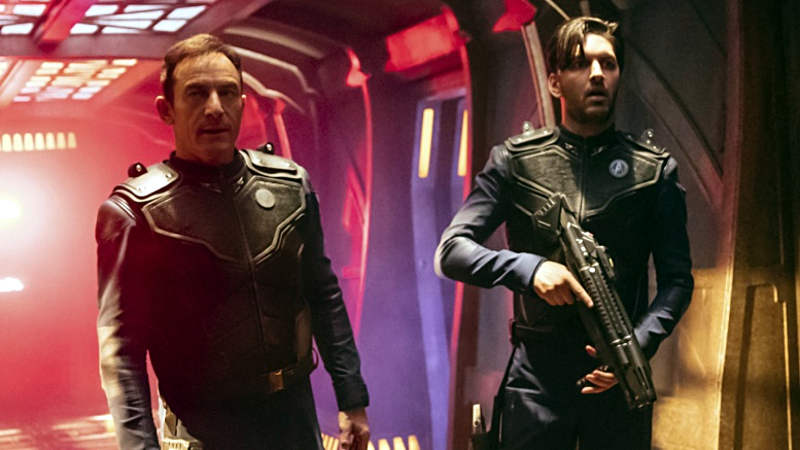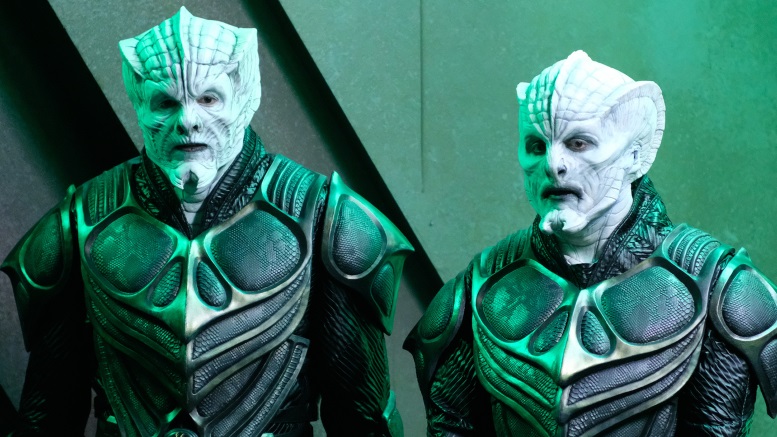Article Content
Can anyone explain what’s happening in L’Rell’s universe?

The biggest problem with Discovery is that too much of the larger narrative feels like a messy, contrived improvisation that suffers from the fact that entire scenes — possibly entire subplots — appear to be missing. Consider this episode, which benefits from some pretty decent character work for Saru — but also features a subplot involving the Klingons that is so fragmented and filled with inexplicable character actions that it sometimes borders on incoherence. Even the title — "Si Vis Pacem, Para Bellum," which translates to "If you want peace, prepare for war" — doesn’t really make sense given what’s actually happening in the episode. (The war has already been underway for months, so why are the writers being both pretentious and inaccurate?)
Orville’s ‘Into the Fold’ crashes and burns

It seems fitting that the first script credited to Voyager alums Brannon Braga and Andre Bormanis involves a Shuttle Crash [TM]. It’s a shuttle crash that, from the looks of it, should’ve left everyone aboard, with the possible exception of Isaac, quite dead. The tail end of the shuttle even breaks off, like the plane in Lost. This leaves our crash survivors separated from each other.
Specifically, this leaves Dr. Claire Finn separated from her two young sons (we learn here that she’s a single mother by choice), who are protected by Isaac, who must play the role of Dad to the two kids, Marcus and Ty (BJ Tanner and Kai Di’Nilo Wener), who — let’s be honest — are pretty damn annoying. (Yes, kids can be annoying. I know this. I have two of them. That doesn’t make it easier to watch annoying kids on TV.)
Live. Dance. Die. Repeat.

At the center of the very Trekkian time-loop plot of “Magic That Can Make the Sanest Man Go Mad” is an intimate character story about pesky human emotions and what they mean to a character who was raised the Vulcan way. Michael Burnham has never been in love, and she has never admitted this fact to anyone — which is particularly notable in that she feels she needs to keep it a secret at all, as if it’s something that brings her embarrassment or shame.
That’s an intriguing personal wrinkle to a character with a Vulcan facade who struggles with inner emotional questions. (Indeed, I have often wondered in general how Vulcans process the feelings of “love” alongside their logical imperatives and their general — although not absolute — claim to eschew emotions. Clearly it falls somewhere on a range, but how does that work?) That these character beats play directly into the plot — where time is repeating Groundhog Day-style and our heroes must figure out a way to escape — is commendable.
I hate it when I get 10 million thumbs down

"Majority Rule," while obvious and unsubtle, feels like a modern-day take on a Twilight Zone episode crossed with Star Trek: TOS. It takes the frequently employed "alternate Earth" approach of those series and gives us an alien society that’s essentially ourselves plus an exaggerated twist — and then mines that for an hour of whimsical social satire/commentary that our heroes find themselves mired in. This is consistently entertaining, albeit not particularly challenging. It alternates scenes of wry observation with others of grand absurdity. In both cases, I got the sense that’s what they were mostly going for.
The story presents us with a "pure democracy" in the form of an alien society that conducts all its legal proceedings (in particular, punitive criminal measures) through social media votes — up or down. Everyone is required to wear a badge with an up and down arrow (you can press someone’s badge with an up or down vote if they do something you like or dislike), and you can vote online to pile on for someone’s mild transgression that somehow ended up in the public eye. If you get more than 10 million down votes during the "judging window" (how the timing of the opening and closing of this window works is not really clear, but who cares), you are sentenced to a "correction" measure to fix your bad behavior — essentially a lobotomy that turns you into a docile mental simpleton.
‘Lethe’ takes a closer look at its characters

Gabriel Lorca is like the Schrödinger’s Captain of Star Trek. Either he’s a well-intended military man who bends the rules for the greater good and has gone a little crazy because of traumatic events — or he’s an amoral self-server willing to sell you out and do who-knows-what-else to save his own ass. You can read the clues of "Lethe" both ways and come to either conclusion. The series seems agnostic on the character so far because it wants to shroud his motivations in mystery and play the long game.
Again, this can be frustrating. I don’t have to root for the guy to necessarily get something out of watching him. But I feel like I should at least know I have enough information to make some sort of moral judgment about his actions. But the series is vague and doesn’t seem to believe there’s merit in having the truth be in the details; instead, the mysteries are in the fog.
‘Discovery’: Choose your narrative pain point

“Choose Your Pain” is an intriguing, entertaining, confusing, and frustrating hour that’s proving Discovery to be, at times, a maddeningly murky narrative engine that can work well moment to moment. This series operates in a very gray area. I’m not talking about gray morality (although there’s plenty of that for sure); I’m talking about gray narrative clarity. I’m doing my best to keep up with the characters’ motivations, but the vagueness and choppiness of the plot are not helping. Watching this show can be like walking on ground that shifts beneath your feet.
Is this show merely trying to keep me off guard, or is it kind of a mess? Characters’ actions can seem wildly inconsistent, perhaps because I previously read them wrong, or perhaps because the writing was done haphazardly by committee. Time will tell — unless, of course, it doesn’t. My comments from last week apply again here: I’m not sure if this series is just sloppy, or if they’re strategically hiding things so they can reveal more later. Maybe both. But that makes for a sometimes strange viewing experience.
‘Orville’ goes undercover in entertaining ‘Krill’

“Chris” and “Devin” (Fox)
The Orville comes to the rescue of a Union colony under attack by a Krill vessel. Mercer’s tactical cleverness is able to outmaneuver the Krill’s superior firepower to win the battle and destroy the Krill ship. In the wreckage, the crew discovers an unscathed Krill shuttlecraft, which presents an opportunity for the Union: They can use the shuttle to send some operatives undercover as Krill crew members in an intelligence-gathering mission to learn about this mysterious enemy and their motives. Specifically, the assignment is to retrieve a copy of the holy book that guides the Krill’s deeply held religious beliefs, in the hopes that we might learn what drives their society. Mercer and Malloy take on this task — for which they are not particularly well equipped.
"Krill" is the best episode of The Orville yet. It’s the first episode that from start to finish feels like it’s living in its own skin and starting to build its own universe, rather than reassembling pilfered pieces from here and there. Sure, the plot (undercover characters pose as the enemy) is another take on a reliable standby, but that’s perfectly fine. I have no problem with new takes on reliable devices if the writers can bring a sense of energy or specificity. This is an entertaining, well-paced, breezy hour that works on the lightweight terms where this series lives.
Mixed bag of ‘Butcher’s Knife’ lacks sharpness

One of the things about Discovery’s serialized format is that it’s hard to know whether questions I have with the story will be answered soon, later, or never — whether gaps are a result of unfinished long-form storytelling or simply sloppy writing. With certain aspects of "The Butcher’s Knife Cares Not for the Lamb’s Cry," I’m leaning toward the latter.
Consider the plot’s central motivation, which is that the tactically crucial dilithium mines on Corvan II — which are responsible for nearly half the Federation’s fuel supply — are under attack by the Klingons, and Starfleet needs the Discovery to come through with a miracle by making its experimental spore-drive engine technology functional so they can get there before the defenses fall and the Klingons kill everyone and destroy the facility. Why is this crucial facility so utterly defenseless that only a hail-Mary pass employing a starship using untested, dangerous technology can now save it? Starfleet must really be out of practice when it comes to war strategy.
Comedy works in favor of serviceable ‘Pria’

When Pria (Charlize Theron, lured here I presume because she had so much fun with MacFarlane on A Million Ways to Die in the West, like Liam Neeson last week) announces to the crew that she is actually a time-traveler from the 29th century who came back to save and then steal and sell what was the doomed-to-destruction-had-she-not-intervened Orville, my mind immediately went to the con man in TNG‘s "A Matter of Time," and I blurted out to my wife, "Star Trek already did this episode too!" I realized in that moment that I had essentially become the annoying kid Dougie in the South Park episode, "Simpsons Already Did It." This plot was new to my wife; she’s never seen "A Matter of Time" or indeed any of the Trek plots that have been repurposed so far for The Orville. Maybe I just need to let it go already.
Granted, this is an ongoing liability with The Orville, which is that these stories can sometimes seem like reheated Trek leftovers and thus distract from themselves, even when that critique really isn’t fair (and it’s not here). "Pria" does enough of its own stuff to be its own thing, and it does it fairly entertainingly — a marked improvement over last week’s tepid "If the Stars Should Appear." Granted, it still sorely lacks conviction in its semi-dramatic intentions (and the sci-fi is fine if unambitious), but it’s a more enjoyable effort for sure, and possibly the most purely enjoyable Orville episode so far.
‘Discovery’ seeks context as it begins (again)

The key scene in “Context Is for Kings” is the one where Burnham explains herself to Captain Lorca, after having come to the conclusion that he has orchestrated her release from prison so he could recruit her onto his crew to do dirty work on his behalf.
She explains the reason she mutinied against her captain — her mentor — was because she thought she was taking the only course of action that would protect the Federation and, by extension, its values. That she had to break the Starfleet chain of command — one of those key values — is the paradox she must answer for. Her prison sentence was the cost of her actions and one she intends to pay. But she sees herself not as a renegade but as someone who made an extreme choice in an extreme moment that she thought was for the greater good.
